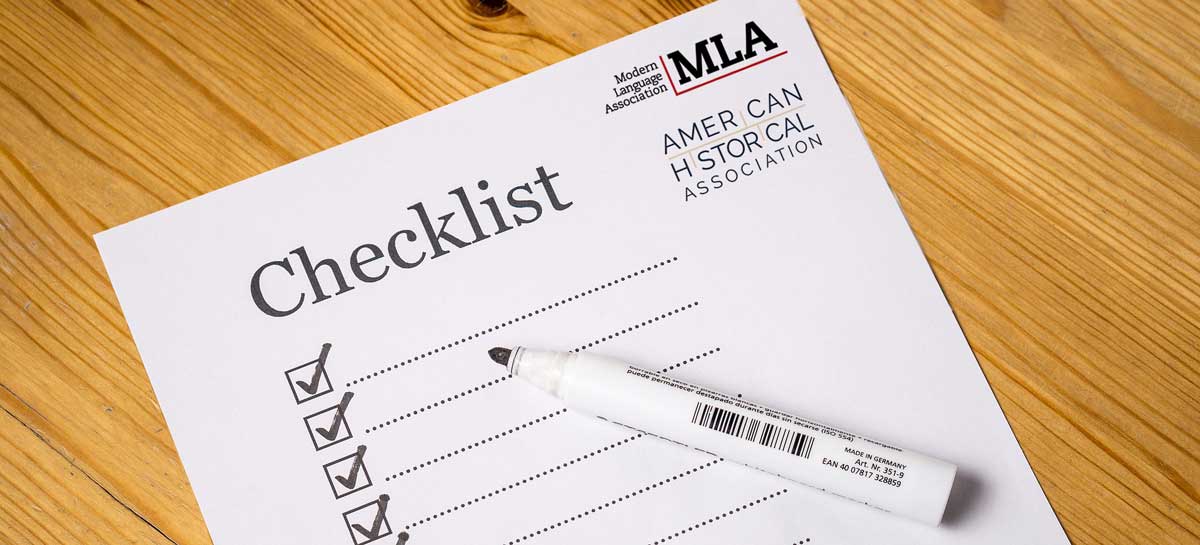By Maria LaMonaca Wisdom

In 2019, the Modern Language Association (MLA) and the American Historical Association (AHA) will be holding their annual conventions in the same city (Chicago) at the same time (January 3-6). These large professional gatherings offer unparalleled opportunities for learning and networking, but they can be intimidating and stressful as well, especially for those newer to the profession.
One of the reasons the MLA and AHA annual conventions can feel so intimidating is because—like academia itself—they’re institutions, having been around for a really long time (the first meetings were in 1883 and 1884, respectively). And like everything else in academia, change lags behind the times.
But the conventions have changed over the years, and (I’d argue) for the better.
I recall one of my graduate school mentors—a very distinguished feminist literary critic—telling me that when she interviewed for her first job at MLA, she threw up in an ashtray in the hotel lobby. Likely this was in the late 60s: My professor was then a young woman, entering what was surely at the time a very male-dominated and unwelcoming sphere.
Decades later, my own first experience at MLA was (happily) not nearly as traumatic, although I found it jarring to show up on December 27 (for many years, the first day of the convention), in an ornate San Francisco hotel lobby filled with gilded decorations, jolly Santa Clauses, and troops of black-clad job seekers looking anything but merry.
Change did come, and for the better. In 2011, the MLA convention finally moved to early January, reducing family conflicts for many participants. But that wasn’t all. With the advent of Skype and other videoconferencing platforms, increasing numbers of academic job searches became untethered from the convention. Although plenty of schools still interview at the MLA and AHA, it’s more likely that you can now become a finalist for a faculty position without ever having to attend an annual convention.
The decrease in academic job interviews at the MLA and AHA has been accompanied by a corresponding rise in panels, sessions, and other events to support graduate student professionalization more broadly. These offerings include conversations and resources to help students prepare for a range of faculty careers (including tenure-track positions at teaching-intensive schools); do cool and interesting things with pedagogy, public scholarship, and the digital humanities; and explore careers beyond academia.
So my advice: If you are headed to MLA or AHA for the first (or even second) time, educate yourself first on everything that will be available to you. Given the potential for convention overwhelm, it would be easy and understandable to limit yourself to just a few things—such as a couple of convention sessions on topics related to your research, your dissertation director’s session, and your Ph.D. program’s evening reception—before heading off to the Field Museum and deep-dish pizza.
No one can do it all, so it pays to go in with a game plan. Start by reading both the AHA convention program and the MLA convention program, because this year, one registration gives you access to events at both conventions. I particularly encourage you to look out for the following—the newer kinds of professional development sessions, aka “not your Grandma’s MLA (or AHA)”:
MLA
- “Humanities in Five: A Contest”: “A contest of scholars from multiple fields presenting five-minute descriptions of their work in accessible language”
- Sessions on topics such as “Reimagining the Dissertation” (Session No. 132), “Interactive Storytelling” (302), and “Networking for Humanities PhDs” (672)
- The “Possible Futures Career Fair”, with recruiters from mission-driven organizations and companies
AHA
- Sessions on such topics as “Perspectives on Internships for History PhDs” (4), “History Podcasting” (14), “Public History Careers” (62), and “Research Life Outside the Academy” (121)
- The “AHA Career Fair”, featuring historians from a variety of fields beyond the academy
- A “THAT (Humanities and Technology) Camp”, in collaboration with MLA
VH@Duke will also be represented among the sessions—“How Do We Fix the Advising Model for Humanities PhD Students,” (AHA 60 and MLA 490) and “Innovations in Doctoral Education: Building Strong Partnerships” (AHA 188 and MLA 364). But seriously, as much as we always love to see you, consider doing something else. If you’ve been reading your VH@Duke newsletters and blog assiduously, you’ve heard enough from us. Go out and learn about what everyone else is doing and presenting. Then come back and share it with us, because Versatile or not, we can’t be everywhere in Chicago at once.
